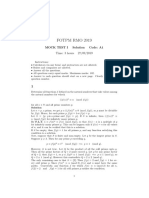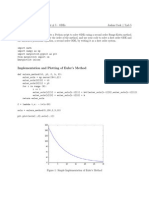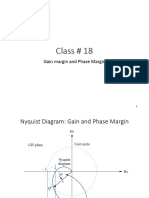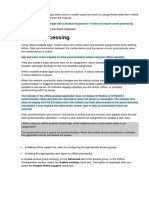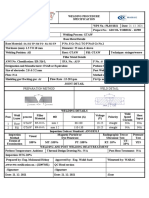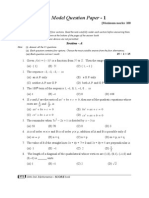Y' F (T, Y), a:St:Sb, y (A) A,: (T K4 (T K I :K1 - ) K4)
Uploaded by
Allison MooreY' F (T, Y), a:St:Sb, y (A) A,: (T K4 (T K I :K1 - ) K4)
Uploaded by
Allison MooreRunge-Kutta-Fehlberg
To approximate the solution of the initial-value problem
y' = f(t,y), a :St :Sb, y(a) = a,
with local truncation error within a given tolerance:
INPUT endpoints a, b; initial condition a; tolerance TOL; maximum step size hma.x;
minimum step size hmin.
OUTPUT t, w, h where w approximates y(t) and the step size h was used, or a message
that the minimum step size was exceeded.
Step 1 Set t = a;
w=a;
h = hma.x;
FLAG= 1;
OUTPUT (t, w).
Step 2 While (FLAG= 1) do Steps 3-11.
Step 3 Set K 1 = hf (t, w);
= hf (t + ¼h, w + ¼K1);
K2
K3 = hf (t + }h, w + -b_K1 + iK2);
K4 = hf (t + Hh, W + ~i~~K1 - ;i~K2 + ;i~~K3);
K5 = hf (t + h, w + i~:K1 - 8K2 + 356183°K3 - ]~K4);
K6 = hf (t + ½h, w - iK1 + 2K2 - ~;~K3 + !~~K4 - !diKs).
Step 4 Set R = iil I 360 2197 K4 + soI Ks + ss
1 K1 - 128 K3 - 75240 2 K6 I·
4275
(Note: R = ¼lti\+1 - w;+d-)
Step 5 If R :S TOL then do Steps 6 and 7.
Step 6 Sett = t + h; (Approximation accepted.)
5
w = w + f16K1 + + !:~K4 - ½Ks.
Step 7 oUTPUT (t, w,~~4
Step 8 Set 8 == 0.84(TOL/R) .
Step 9 If 8 0.1 then set h == 0th.th et h == 4h
else ifS :=:: 4 en s
else set h == 8h, (Calculate new h.)
Step 10 If h > hmax then set h_== hmax.
Step 11 If t > b then set FLAG == O t
- else if t + h > b then set h == b .-
else if h < hmm then
set FI.AG == 0;
OUTPUT ('minimum h exceeded').
(Procedure completed unsuccessfully.)
Step 12 (The procedure is complete.)
STOP. I
5
Example 1 Use the Runge-Kutta-Fehlberg method with a tolerance TOL == 1~- , a maximu~ step size
hmax = 0.25, and a minimum step size hmin == 0.01 to approximate the solution to the
initial-value problem
y' =y - t 2 + 1, 0 t 2, y(O) == 0.5,
and compare the results with the exact solution y(t) = (t + 1) 2 - 0.5e1•
Solution We will work through the first step of the calculations and then apply Algorithm
5.3 to determine the remaining results. The initial condition gives to = 0 and wo = 0.5. To
determine w1 using h = 0.25, the maximum allowable stepsize, we compute
k1 = hf (to, wo) = 0.25 (0.5 - 02 + 1) = 0.375;
k, = hf ( l-0 + ih, Wo + ik,) = 0.25 Go.25, 0.5 + ~0.375) = 0.3974609;
k3 = hf (to+ ~8 h, wo + 2_k 1 + :!__k2)
32 32
=0.25 ( 0.09375. 0.5 + :2 0.375 + :2 0.3974609) = 0.4095383;
k4 = hf (to+ 12 h, Wo + 1932 k1 - 7200 k + 7296 )
13 2197 2197 2 2197k3
= o.25 (o.2307692' o·5 + 2197°·
1932
375 - 7200 7296
- 0.3974609 + -0.4095383
)
2197 2197
= 0.4584971;
439
ks = hf (to+ h, w 0 + ki _ 8k2 + ~ k 845 )
216 513 3 - 4104k4
=0.25 ( 0.25, 0.5 + 0.375 - 8(0.3974609) + 3680 . ~0.4584971)
5 13 0.4095383 - 4104
=0.4658452·'
You might also like
- Problem1:: Water Exerts Pressure On The Upstream Face of A Dame As Shown in Following FigureNo ratings yetProblem1:: Water Exerts Pressure On The Upstream Face of A Dame As Shown in Following Figure9 pages
- Runge-Kutta-Fehlberg: (T K4 (T K I :K1 - ) K4)No ratings yetRunge-Kutta-Fehlberg: (T K4 (T K I :K1 - ) K4)2 pages
- Runge-Kutta (Order Four) : To Approximate The Solution of The Initial-Value ProblemNo ratings yetRunge-Kutta (Order Four) : To Approximate The Solution of The Initial-Value Problem2 pages
- Projectile - Assignment - F2024 - Ange - 2.0No ratings yetProjectile - Assignment - F2024 - Ange - 2.05 pages
- Numerical Solution of Ordinary Differential EquationsNo ratings yetNumerical Solution of Ordinary Differential Equations30 pages
- Algorithms and Data Structures Lecture Slides: Asymptotic Notations and Growth Rate of Functions, Brassard Chap. 3No ratings yetAlgorithms and Data Structures Lecture Slides: Asymptotic Notations and Growth Rate of Functions, Brassard Chap. 341 pages
- LUCRARE PRACTICA: Exponentierea Modulară: Z 1 Z Z Mod N 1 Then Z Z X Mod N 1994 Mod 8094 3022No ratings yetLUCRARE PRACTICA: Exponentierea Modulară: Z 1 Z Z Mod N 1 Then Z Z X Mod N 1994 Mod 8094 30223 pages
- Project 02: Simple Slope Static and Dynamic AnalysisNo ratings yetProject 02: Simple Slope Static and Dynamic Analysis13 pages
- Student Lecture 35 Inverse Laplace Transforms and U (T-A)No ratings yetStudent Lecture 35 Inverse Laplace Transforms and U (T-A)7 pages
- Program:-: Program For Load Flow by Newton-Raphson MethodNo ratings yetProgram:-: Program For Load Flow by Newton-Raphson Method16 pages
- 4 - Complexitatea Algoritmilor - ExercitiiNo ratings yet4 - Complexitatea Algoritmilor - Exercitii7 pages
- Advanced Engg Mathematics DE ZG 535: Lab SessionNo ratings yetAdvanced Engg Mathematics DE ZG 535: Lab Session18 pages
- Michelle Bodnar, Andrew Lohr February 5, 2018No ratings yetMichelle Bodnar, Andrew Lohr February 5, 201820 pages
- Class+#+18+Gain+and+Phase+Margin++w+Alt+TextNo ratings yetClass+#+18+Gain+and+Phase+Margin++w+Alt+Text22 pages
- Designe and Analysis of Algoritham Mid-Term Equivalent AssignmentNo ratings yetDesigne and Analysis of Algoritham Mid-Term Equivalent Assignment9 pages
- [Mathematical Engineering ] Mikhail Itskov - Tensor Algebra and Tensor Analysis for Engineers_ With Applications to Continuum Mechanics (2019, Springer) [10.1007_978-3-319-98806-1] - libgen.li-59No ratings yet[Mathematical Engineering ] Mikhail Itskov - Tensor Algebra and Tensor Analysis for Engineers_ With Applications to Continuum Mechanics (2019, Springer) [10.1007_978-3-319-98806-1] - libgen.li-595 pages
- 10+2 Level Mathematics For All Exams GMAT, GRE, CAT, SAT, ACT, IIT JEE, WBJEE, ISI, CMI, RMO, INMO, KVPY Etc.From Everand10+2 Level Mathematics For All Exams GMAT, GRE, CAT, SAT, ACT, IIT JEE, WBJEE, ISI, CMI, RMO, INMO, KVPY Etc.No ratings yet
- Trigonometric Ratios to Transformations (Trigonometry) Mathematics E-Book For Public ExamsFrom EverandTrigonometric Ratios to Transformations (Trigonometry) Mathematics E-Book For Public Exams5/5 (1)
- COM SCI 118 Spring 2021 Computer Network Fundamentals: 1 GoalNo ratings yetCOM SCI 118 Spring 2021 Computer Network Fundamentals: 1 Goal3 pages
- Chapter 8 Solution Manual Accounting Information SystemsNo ratings yetChapter 8 Solution Manual Accounting Information Systems19 pages
- Habitat The Place Where A Plant or Any Living Thing Lives Naturally AdaptationNo ratings yetHabitat The Place Where A Plant or Any Living Thing Lives Naturally Adaptation6 pages
- Pessing Libya INC: SA 312 TP 316 TO SA 312 TPNo ratings yetPessing Libya INC: SA 312 TP 316 TO SA 312 TP1 page
- Industrial Profile: Hutti Gold Mines Company LimitedNo ratings yetIndustrial Profile: Hutti Gold Mines Company Limited78 pages
- Art Since 1900 Modernism Antimodernism Postmodernism Hal Foster all chapter instant download100% (2)Art Since 1900 Modernism Antimodernism Postmodernism Hal Foster all chapter instant download65 pages
- Mobile Shop Management System Python _ PDF _ Software Testing _ Relational DatabaseNo ratings yetMobile Shop Management System Python _ PDF _ Software Testing _ Relational Database88 pages
- Earthworks: Theory and Practice of Surveying Review Innovations100% (1)Earthworks: Theory and Practice of Surveying Review Innovations50 pages
- Climate Protection and Environmental Interests in Renewable Energy Law: Perspectives From Brazil and Germany Paula Galbiatti Silveira100% (2)Climate Protection and Environmental Interests in Renewable Energy Law: Perspectives From Brazil and Germany Paula Galbiatti Silveira49 pages
- 10th Samacheer Kalvi Maths EM Public Exam QP Sample 4 PDFNo ratings yet10th Samacheer Kalvi Maths EM Public Exam QP Sample 4 PDF4 pages



